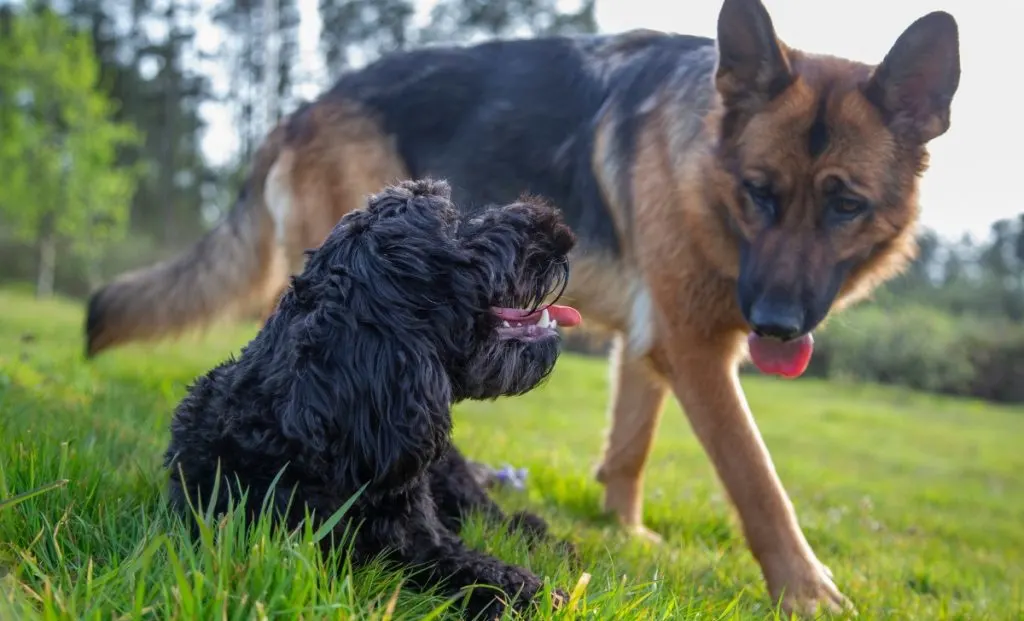In the animal kingdom, there is a rule – the bigger you are, the longer you live, and if that is the case, why do small dogs live longer than big dogs?
Why don’t dogs follow the trend? This creates a puzzle, as evolutionary biologist Professor Mark Elgar of the University of Melbourne’s School of Biosciences says.
Generally, in the mammal world, size is an advantage. The giants of our world, like elephants and whales, tend to lead much longer lives than mice.(1)
The one strange counterexample is the contrast in lifespan in differently-sized dog breeds. It is known that larger dogs do not lead as long a life as their smaller counterparts.
Mastiffs weighing up to 230 pounds have a 6 to 10 years lifespan, while Chihuahuas (never weighing more than 6 pounds) live up to a whopping 16 years (all the data collected from the American Kennel Club).
Bluey (7 June 1910 – 14 November 1939) holds the Guinness World Record for the most elder dog ever. She was a female Australian Cattle Dog owned by Les and Rosalie Hall of Rochester, Victoria.
Different Theories Of Aging
There is also a more profound paradox to the idea of aging, declares De Silva from the Department of Molecular and Biomedical Science.
If I were to ask you why we age, you would probably answer something along the lines of body wear and tear over time. But this would explain how we age, not why we age, and there is a significant difference.
Some species on Earth evolved to live much longer than others, so why don’t we all develop to live longer if aging is somehow avoidable?
Natural Selection

According to Da Silva, the answer hides somewhere in the fact that natural selection weakens with age.
That means that we are potentially more likely to be alive one year from now than two years from now due to the bigger chances of death from different cases. Da Silva says this leads to two significant theories for the evolution of aging.
Mutation Accumulation Theory
Disadvantageous mutations are more challenging to remove from a population by selection if they only act up at older ages.
Therefore, the mutation accumulation theory explains aging as the assembly of deleterious mutations that act at older ages.
Life History Optimization Theory

As Da Silva says, any investment in growth and reproduction can also be made to maintain the body’s condition.
That means that because selection weakens with age, you maximize the offspring produced by growing quickly and reproducing at a younger age rather than conserving your body in peak conditions.
This would be the life history optimization theory of aging.
Why Do Small Dogs Live Longer?
Recently, Da Silva was part of a study(2) that collected data on 164 dog breeds better to understand the causes of the existing lifespan differences.
The data included information like newborn mass, adult body mass, at what age breeds reach 50 percent of their adult mass, litter size, health issues, cause of death, and the average age of death.
Selective Breeding

The study’s findings showed that the decreasing lifespan for dog breeds with increasing body size is most likely because of our recent selective breeding for larger sizes. Meaning it is basically our fault.
Instead of devoting resources for general body upkeep, selection for bigger body size prioritizes resources for early growth. That is reflected in the fact that larger breeds of dogs suffer from more physical disorders from two years old forward (once they attain adult size).
Mutations
Further, mutations that increase body size in canines and laboratory mice also raise the risk of cancer. (3)
This association makes sense when we think that most cancers come from mutations that occur during cell division, with larger individuals having more cell divisions for those mutations to happen.
The researchers suggest that these higher rates of cancer (abnormal cell growth) in larger dogs may result from an “evolutionary lag” in their natural defenses against cancer after we rapidly bred them to be larger.
Da Silva thinks that the evidence points to larger breed canines having briefer lifespans thanks to the investment of resources into rapid growth rather than body maintenance.
This includes protection against cancer, such as fighting cancerous cells and repairing DNA copying errors.
Let’s not forget the fact that larger dogs tend to have larger litters, which defends the life history optimization theory.
This theory also suggests that, over some time, larger dog breeds should evolve better cancer defenses, longer lives, and smaller litters. A tradeoff that we, owners of large dog breeds, will be happy with.
It Seems Size Matters

However true it might be that large mammals live longer, but smaller body sizes within a species are linked to slower aging and longer life. Dogs, as a species, have a considerable size range within different breeds,
Cornelia Kraus is an evolutionary biologist at the University of Göttingen in Germany. She was the lead researcher of a major study of 74 breeds of dogs and more than 56,000 dogs in North American veterinary teaching hospitals.
Kraus has offered up an explanation that big dogs age faster, and “their lives seem to unwind in fast motion.”
Dr. Silvan Urfer, a researcher at the University of Washington, conducted a large study, getting data on 169,000 canines who died or were euthanized within three years at U.S. veterinary clinics. (4)
He found a connection between the breed of the dog and the age at death. Looking at giant breeds, the Great Pyrenees lived the Great Pyrenees longer (12 years) than the Great Danes (10 years).
Dr. Urfer found during the study that small dogs had a longer lifespan (14.95 years); medium-size dogs lived an average of 14 years, while large dogs lived for 13.38 years.
The dog’s body size was the most critical variable in predicting lifespan, even more important than whether or not the dog was purebred and well-bred.
Teefs
If we look at the Journal of the American Animal Hospital Association, Dr. Urfer found that when comparing two pups with all other equal factors, the annual dental cleanings conducted by a veterinarian reduce the risk of death by almost 20 percent.
Dr. Urfer pinpointed that there could be an association between excellent dental health and good general health.
However, it might also be that dog owners taking care of their dog’s teeth would be more likely to deliver preventive veterinary supervision, contributing to a longer lifespan.
Weight
New research coming from the WALTHAM Centre for Pet Nutrition and the University of Liverpool showed that obese and overweight dogs are likelier to live shorter than those at ideal body weight.(5)
Professor of Small Animal Medicine at the University of Liverpool and study co-author Alex German said that owners are usually unaware that their dog is overweight or fat, and many may not realize the result that it can have on the dog.
What they may not know is that if their loved pup is too heavy, they are probably going suffer from other problems such as breathing issues, joint disease, and even certain types of cancer, as well as having a significantly poorer quality of life.
These health and well-being problems can dramatically impact how long they live.
There is a new study that focused on 12 specific breeds found the effect on the lifespan of additional weight on the smallest dog breeds.
Such as Yorkshire Terriers, was even more significant (overweight Yorkies: 13.7 years, normal Yorkies: 16.2 years) than the effect on larger dog breeds, such as the German Shepherd Dogs.(6)
Cognitive Development
A different study asked an interesting question about dog cognition. (7)
Since large-breed dogs have a faster growth rate and physiological pace of aging than small breed dogs, do they also have a quicker pace of cognitive development?
Using nine decision-making and memory tasks, they calculated cognitive development and aging in about 4,000 dogs from 66 different breeds.
They found that there is a general rule for all breeds. Regardless of the size or lifespan of dogs, they tend to follow the same speed of cognitive aging.
Can I Make My Dogs Life Longer
Thanks to the progress in veterinary science and preventive medicine, the life expectancy of our larger animals like the Borobel dog for example who can reach over whooping 200 pounds (as well as the small animals) is increasing.
There are some things we can do to help our dogs live longer and higher quality lives.
Some things you can do include feeding a healthy diet and helping maintain a healthy weight, encouraging breed and age appropriate physical and mental activities, and taking dogs for annual vet checkups and vaccinations.
Provide preventive dental care for dogs and regularly administer heartworm, flea, and tick preventatives. Keeping them safe from accidents and giving them the love and affection they deserve.
References:
- Blagosklonny, Mikhail V. “Big Mice Die Young but Large Animals Live Longer.”Aging, vol. 5, no. 4, 20 Apr. 2013, pp. 227–233, https://doi.org/10.18632/aging.100551.
- Jack da Silva, and Bethany Jane Cross. “Dog Life Spans and the Evolution of Aging.” The American Naturalist, vol. 201, no. 6, 1 June 2023, pp. E140–E152, www.journals.uchicago.edu/doi/10.1086/724384, https://doi.org/10.1086/724384. Accessed 27 March 2024.
- Bartke, Andrzej. “Growth Hormone and Aging.” Reviews in Endocrine and Metabolic Disorders, 1 October 2020, https://doi.org/10.1007/s11154-020-09593-2.
- Urfer, Silvan R., et al. “Risk Factors Associated with Lifespan in Pet Dogs Evaluated in Primary Care Veterinary Hospitals.” Journal of the American Animal Hospital Association, vol. 55, no. 3, 1 May 2019, pp. 130–137, https://doi.org/10.5326/jaaha-ms-6763. It was accessed on 23 April 2021.
- Homess, Melinda. “Overweight Dogs May Live Shorter Lives | WALTHAM.” Www.waltham.com, 2 April 2022, www.waltham.com/news-events/nutrition/overweight-dogs-may-live-shorter-lives.
- Salt, Carina, et al. “Association between Life Span and Body Condition in Neutered Client‐Owned Dogs.” Journal of Veterinary Internal Medicine, vol. 33, no. 1, 11 December 2018, https://doi.org/10.1111/jvim.15367.
- Watowich, Marina M., et al. “Age Influences Domestic Dog Cognitive Performance Independent of Average Breed Lifespan.” Animal Cognition, 30 April 2020, https://doi.org/10.1007/s10071-020-01385-0. Accessed 27 March 2020.

Nandina has been a lifelong dog owner and enthusiast. She shared her home with multiple breeds, including Giant Schnauzers, Cane Corsos, and Huskies. Currently, she is raising a three-year-old rescue and a working-line German Shepherd puppy.
Actively engaged in IGP dog sports for two years, Nandina is a certified instructor for basic obedience and socialization. She works as a trainer in her local dog sports club, and in her spare time, she handicrafts biothane gear for dogs.
